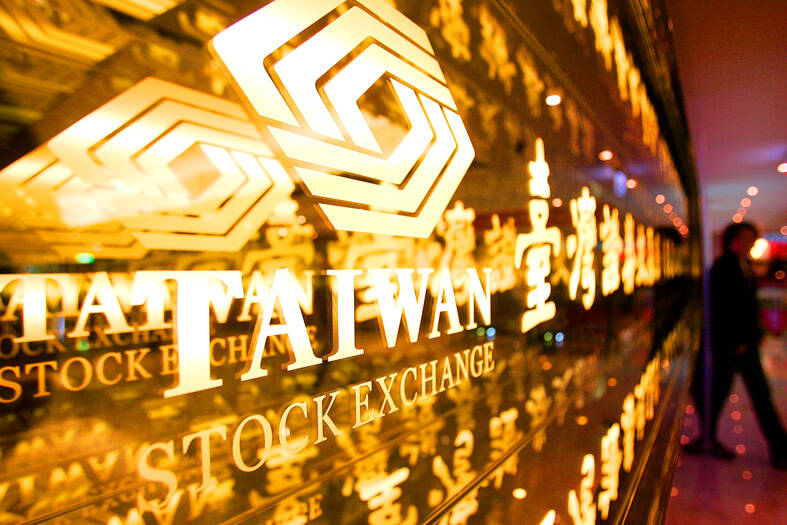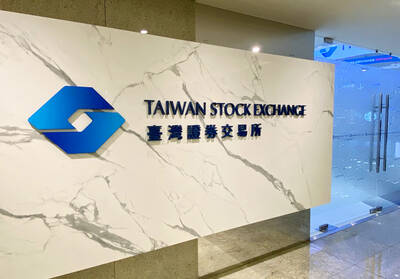Companies listed on the Taiwan Stock Exchange (TWSE) saw their combined pretax profit increase more last quarter than in the second quarter, thanks to profit growth in the semiconductor, shipping and electronic components sectors, exchange data showed yesterday.
The combined pretax profit of the TWSE’s 953 listed companies, not including 14 financial firms, rose 17.5 percent year-on-year to NT$940 billion (US$30.22 billion) last quarter, higher than the second quarter’s 5.5 percent increase, but lower than the first quarter’s 27 percent rise, TWSE data showed.
TWSE-listed companies’ cumulative pretax profit for the first three quarters rose 14.93 percent annually to NT$3.64 trillion, less than the 92 percent annual increase recorded during the same period last year, when local companies benefited from an economic recovery, robust global demand for tech gadgets and skyrocketing shipping rates, the exchange said.

Photo: Maurice Tsai, Bloomberg
For this year, the main growth momentum came from the semiconductor sector, which benefited from increased demand for emerging technologies such as 5G applications, high-performance computing devices and automotive electronics, despite lower demand for consumer electronics, it said.
Even though shipping rates have dropped this year due to eased congestion at seaports worldwide, they are still high, benefiting local shipping firms, the exchange said, adding that shipping companies also benefited from the appreciation of the greenback against the New Taiwan dollar as their contracts are generally US dollar-denominated.
Meanwhile, suppliers of electronic components benefited from stable demand for 5G devices and automotive electronics, the TWSE said.
However, the flat panel, plastics and steel sectors saw a decline in cumulative pretax profit, due to inflation, rising prices of raw materials and cooler property markets, it said.
Among TWSE-listed companies, the 876 locally based firms reported that cumulative pretax profit increased 14.5 percent annually to NT$3.54 trillion, while the 77 companies registered overseas posted a 32 percent increase to NT$103.3 billion.

Taiwan Semiconductor Manufacturing Co (TSMC, 台積電) secured a record 70.2 percent share of the global foundry business in the second quarter, up from 67.6 percent the previous quarter, and continued widening its lead over second-placed Samsung Electronics Co, TrendForce Corp (集邦科技) said on Monday. TSMC posted US$30.24 billion in sales in the April-to-June period, up 18.5 percent from the previous quarter, driven by major smartphone customers entering their ramp-up cycle and robust demand for artificial intelligence chips, laptops and PCs, which boosted wafer shipments and average selling prices, TrendForce said in a report. Samsung’s sales also grew in the second quarter, up

LIMITED IMPACT: Investor confidence was likely sustained by its relatively small exposure to the Chinese market, as only less advanced chips are made in Nanjing Taiwan Semiconductor Manufacturing Co (TSMC, 台積電) saw its stock price close steady yesterday in a sign that the loss of the validated end user (VEU) status for its Nanjing, China, fab should have a mild impact on the world’s biggest contract chipmaker financially and technologically. Media reports about the waiver loss sent TSMC down 1.29 percent during the early trading session yesterday, but the stock soon regained strength and ended at NT$1,160, unchanged from Tuesday. Investors’ confidence in TSMC was likely built on its relatively small exposure to the Chinese market, as Chinese customers contributed about 9 percent to TSMC’s revenue last

Taiwan and Japan will kick off a series of cross border listings of exchange-traded funds (ETFs) this month, a milestone for the internationalization of the local ETF market, the Taiwan Stock Exchange (TWSE) said Wednesday. In a statement, the TWSE said the cross border ETF listings between Taiwan and Japan are expected to boost the local capital market’s visibility internationally and serve as a key for Taiwan becoming an asset management hub in the region. An ETF, a pooled investment security that is traded like an individual stock, can be tracked from the price of a single stock to a large and

Despite global geopolitical uncertainties and macroeconomic volatility, DBS Bank Taiwan (星展台灣) yesterday reported that its first-half revenue rose 10 percent year-on-year to a record NT$16.5 billion (US$537.8 million), while net profit surged 65 percent to an unprecedented NT$4.4 billion. The nation’s largest foreign bank made the announcement on the second anniversary of its integration with Citibank Taiwan Ltd’s (花旗台灣) consumer banking business. “Taiwan is a key market for DBS. Over the years, we have consistently demonstrated our commitment to deepening our presence in Taiwan, not only via continued investment to support franchise growth, but also through a series of bolt-on acquisitions,” DBS